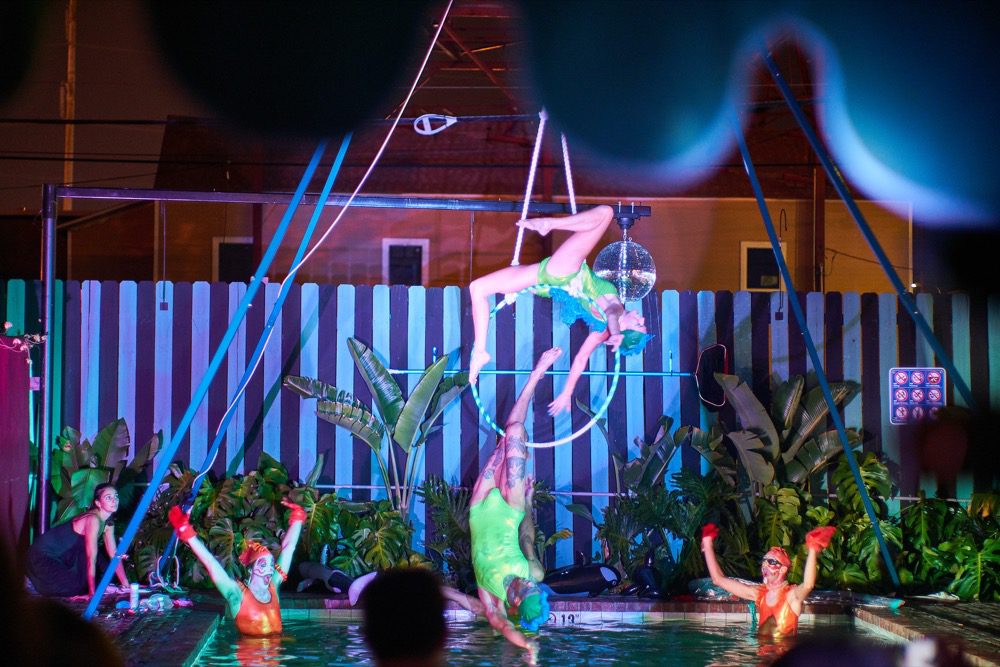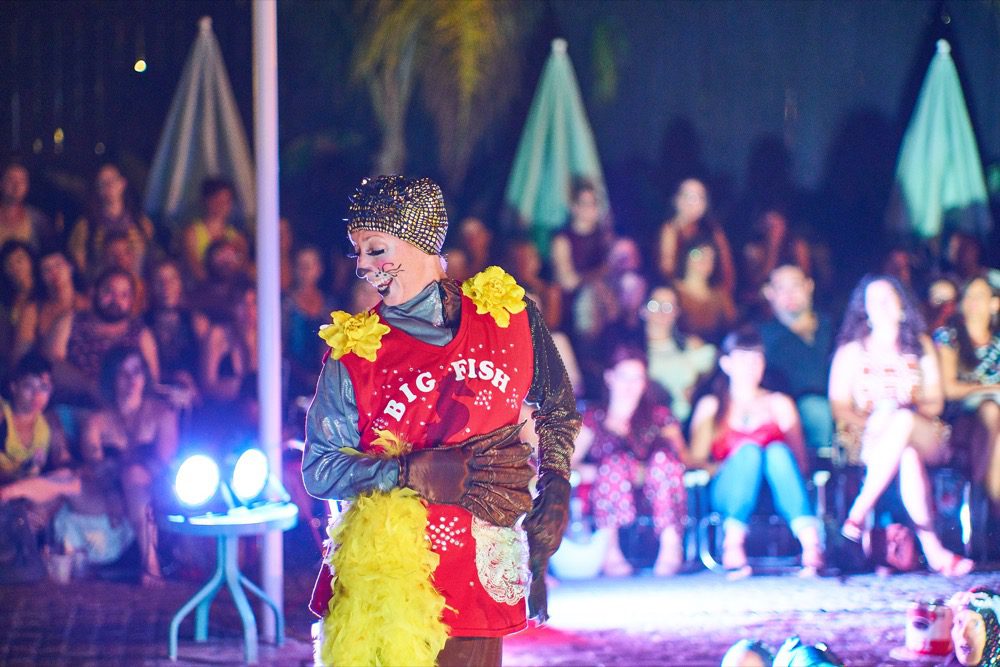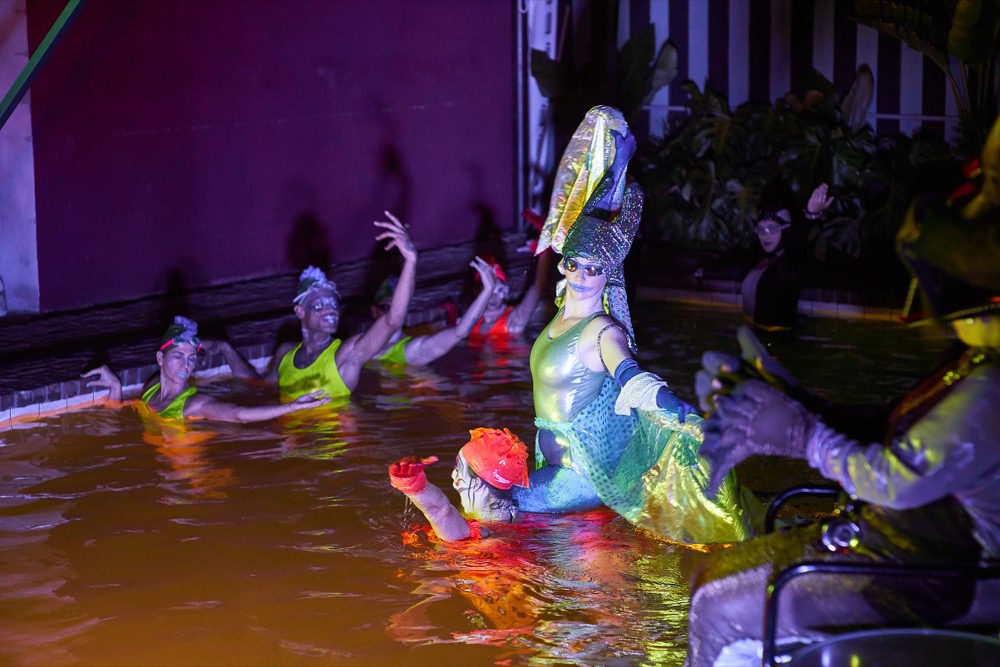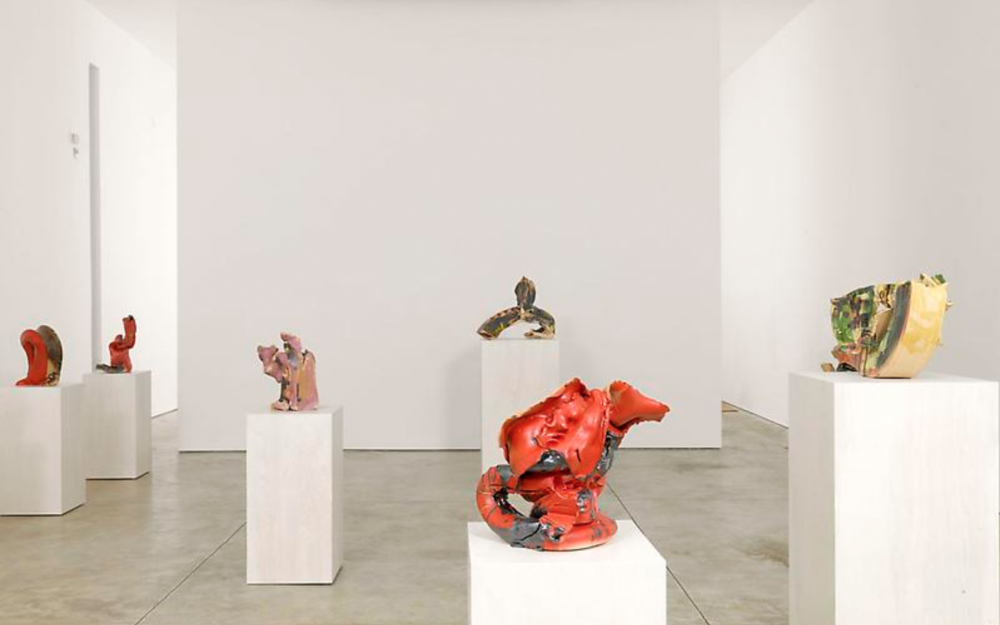Orwell at the Pool: Aqua Mob New Orleans’ “Two Legs Bad” at the Drifter Hotel
As part of our “Queer Tropics” editorial series, Brooke Sauvage recalls Aqua Mob New Orleans’ water-ballet version of George Orwell’s classic dystopian novella, which premiered last fall.

Aqua Mob New Orleans’ Two Legs Bad at the Drifter Hotel, New Orleans. Photo by Eli Mergel.
Stepping into the Drifter Hotel last September for Aqua Mob New Orleans’ production of Two Legs Bad—a water-ballet adaptation of George Orwell’s classic, Soviet-inspired novella Animal Farm—gave me the immediate impression of being on an acid trip: Klezmer music animated a lively scene of sea creatures—performers in garish, waterproof makeup, bobbing around in scintillating costumes in the lit outdoor pool, punctuated by the barking of humans dressed as sea lions in handlebar mustaches.
Repurposing Animal Farm into a gaudy, Pop-Surrealist water ballet in New Orleans is about as wild as it gets. Perhaps this premise, which I can only describe as “extra,” in the parlance of our times, accounts for why it’s so compelling.
Two Legs Bad was a show within a show: The audience watched a show about a cabal of marine animals putting on a show at an aquarium. A well-timed joke about rosé and Instagram filters landed just after settling in with a bottle of rosé, immersing me in the show’s kaleidoscopic referentiality by first gulp.

Aqua Mob New Orleans’ Two Legs Bad at the Drifter Hotel, New Orleans. Photo by Eli Mergel.
The sea creatures-turned-comrades in arms band together to overthrow their human maestro, Winston. Led by two sea lions, Snowball and Napoleon, the seahorses, clownfish, and manta rays kill their ringmaster in a cheering chorus, celebrating their liberation from their two-bit routine performed for humans in aquarium bleacher seats.
In their newfound freedom, they rally under the banner of “creature-ism,” the main commandment of which is “two legs bad,” an adaptation of the hallmark “two legs bad, four legs good” from Orwell’s book, here abbreviated to accommodate legless marine life. They will perform their own show—for creatures, by creatures—to benefit themselves. They are promised retirement, an alternative to their otherwise inevitable, unsavory end as fish sticks.
It all sounds fine and good until one of the sea lions, eyeing the liberated sea creatures and contemplating their dormant money-making potential, squeals, “But think of the revenue!”
One would think, especially given the current political moment, that we’re able to identify abuses of power. That we’re familiar with its tropes. That we can hopefully call it out when we see it. Two Legs Bad, and even Animal Farm, follows a predictable pattern: The sea creatures work longer hours at more daring routines (including some dazzling aerial numbers over the pool). Both sea lions indulge in premium snacks at the expense of their comrades.
Napoleon starts hitting the hooch, and Snowball plots his partner’s demise. By the time he orchestrates a hit on Napoleon, Snowball is no better (and perhaps worse) than the two-legged Winston whose rule prompted the revolution in the first place. Thus, the vision for egalitarian, seaworthy entertainment is foiled by Snowball’s lusty agenda, and the sea creatures accept their fate as peons without a cause.

Aqua Mob New Orleans’ Two Legs Bad at the Drifter Hotel, New Orleans. Photo by Eli Mergel.
Aesthetically, Two Legs Bad resembles a combination of Olympic gymnastics routines and Jurassic Park: Think scintillating fabrics in fantastical configurations; the manta ray wears a sweeping cape; the clownfish sally about in Lycra leotards; swim caps are adorned with dinosaur-like ruffled crests. Lest we forget, this is synchronized swimming, which is about as bizarre and bygone of a genre as any—here served with an additional splash of esoteric entertainment in the form of Klezmer renditions of Lady Gaga’s “Bad Romance.”
This violent circus (blow-up killer whales are called on as repeat assassins) is a reminder of the cartoonish obliviousness of the Trump presidency and the absolute farce of tyranny, so ludicrous as to be laughable. When it’s so easy to make a joke, one might forget how sinister it is—which is precisely what makes tyranny so sinister.
The show frequently references its artificiality as a production, as a show, Two Legs Bad, about producing a show based on a book, Animal Farm. This makes the audience feel hyperaware of its position. Similarly, one can understand the parallels between these fictional abuses of power and the current political moment—which is not so far from a reality-TV show, led by an actual, former reality-TV star.
What is real? What is illusion? Where does the madcap, sideshow begin and end? If, as Jenny Holzer says, “abuse of power comes as no surprise,” then how many times do we have to watch the same story play out before something changes?
Editor's Note
Aqua Mob New Orleans’ Two Legs Bad was performed September 21–30, 2017, at the Drifter Hotel (3522 Tulane Avenue) in New Orleans.



